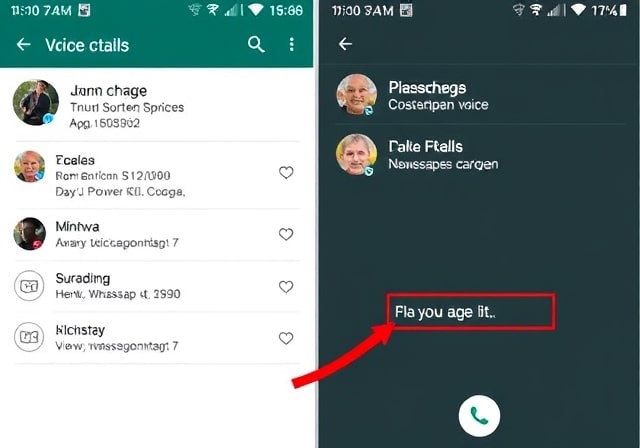In the digital age, privacy and security have become significant concerns. Some individuals may seek to use fake details or third-party tools for WhatsApp voice calls, often to hide their identity or engage in anonymous communication. While these methods might seem tempting, they come with serious risks, legal implications, and potential ethical concerns. This article explores the concept of using fake details in WhatsApp voice calls, examines its consequences, and provides guidance on maintaining privacy responsibly without resorting to unethical practices.
What Are Fake Details in WhatsApp Voice Calls?
Fake details in the context of WhatsApp voice calls usually refer to:
- Fake Phone Numbers: Using temporary or virtual phone numbers to create WhatsApp accounts.
- Spoofing Caller IDs: Employing software to manipulate the displayed caller ID during voice calls.
- False Personal Information: Providing incorrect details such as fake names or profile photos in WhatsApp accounts.
While some users might justify these actions for privacy, they often cross into illegitimate and unethical territory.
How People Use Fake Details on WhatsApp?
Several methods are commonly employed to create anonymity or fake identities on WhatsApp:
1. Virtual Numbers
Apps and services provide temporary phone numbers that can be used to register on WhatsApp. Examples include:
- TextNow
- Google Voice
- Burner
2. Caller ID Spoofing
Spoofing apps manipulate the phone number displayed during a call, making it appear as though the call is coming from a different number.
3. Disposable Email Addresses
Although WhatsApp primarily uses phone numbers, some users may also use fake emails to sign up for backup or related services.
Earnkarado.com WhatsApp Tracker
Why People Resort to Fake Details?
1. Privacy Concerns
Some users want to maintain anonymity when interacting with strangers or conducting business.
2. Pranks or Harassment
Unfortunately, some misuse these methods to prank or harass others, often crossing legal boundaries.
3. Access Restrictions
Users in regions where WhatsApp is restricted may use fake details to bypass limitations.
Bazartak.com Splendor Bike Offer
Risks and Consequences of Using Fake Details
1. Legal Repercussions
Using fake details or spoofing calls can violate local laws. In many countries, caller ID spoofing and fraud-related activities are criminal offenses.
2. Account Suspension
WhatsApp has strict policies against using fake numbers or details. Accounts violating these policies may be permanently banned.
3. Security Threats
Third-party apps and tools used for spoofing or generating fake numbers often expose users to malware, phishing, or data theft.
4. Ethical Concerns
Hiding behind fake details to engage in unethical behavior, such as harassment or fraud, can damage personal and professional relationships.
How to Ensure Privacy on WhatsApp Without Using Fake Details
Instead of resorting to unethical practices, consider these legitimate ways to enhance your privacy:
1. Adjust Privacy Settings
WhatsApp allows you to control who can see your:
- Profile picture
- Last seen status
- About information
- Status updates
Navigate to Settings > Privacy to customize these options.
2. Use Two-Step Verification
Enable two-step verification to secure your account with a PIN. This adds an extra layer of protection.
3. Use Legitimate Secondary Numbers
If privacy is a concern, use a legitimate secondary phone number for WhatsApp instead of relying on fake numbers.
4. Avoid Unnecessary Sharing
Be cautious about sharing your WhatsApp number publicly or with untrusted contacts.
Legal and Ethical Considerations
Using fake details on WhatsApp voice calls often breaches the platform’s terms of service. Additionally, it may violate local telecommunications laws, particularly in cases involving:
- Fraud
- Harassment
- Identity theft
Instead of engaging in such practices, focus on ethical communication and adhere to the rules of the platform.
FAQs About Fake Details in WhatsApp Voice Calls
1. Is it illegal to use fake details on WhatsApp?
Yes, in many regions, using fake details or caller ID spoofing can lead to legal consequences.
2. Can WhatsApp detect fake numbers?
WhatsApp actively monitors and bans accounts using fake or temporary numbers to violate its terms of service.
3. How can I protect my privacy on WhatsApp?
Use WhatsApp’s privacy settings, enable two-step verification, and avoid sharing your number publicly.
4. What should I do if I receive a spoofed call on WhatsApp?
Block the number, report it to WhatsApp, and avoid engaging with suspicious callers.
5. Are there safe alternatives to anonymous communication?
If anonymity is required for legitimate reasons, consider platforms designed for privacy, such as Signal, which emphasizes secure and private communication.
Conclusion
Using fake details in WhatsApp voice calls might seem like an easy solution for privacy concerns, but it carries significant risks and ethical dilemmas. Instead of resorting to such methods, leverage the robust privacy features built into WhatsApp or explore other secure communication platforms. Always prioritize legality and ethical behavior in your digital interactions.
